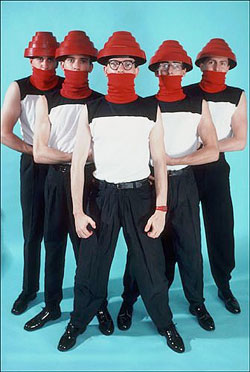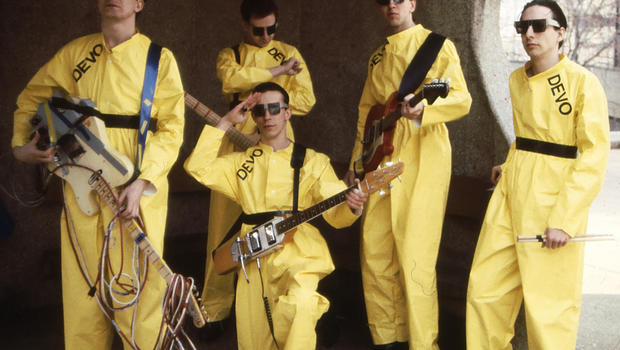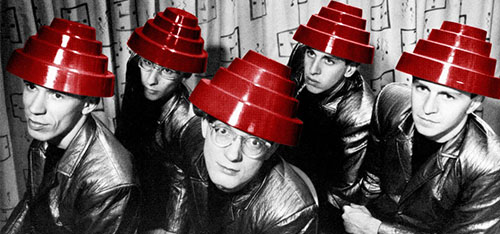The name "Devo" comes "from their concept of 'de-evolution' -
the idea that instead of continuing to evolve, mankind has actually begun to regress,
as evidenced by the dysfunction and herd mentality of American society."
This idea was developed as a joke by Kent State University art students Gerald Casale and
Bob Lewis as early as the late 1960s. Casale and Lewis created a number of satirical art pieces in a devolution vein.
At this time, Casale had also performed with the local band 15-60-75 (The Numbers Band).
 They met Mark Mothersbaugh around 1970, who introduced them to the pamphlet "Jocko Homo Heavenbound",
which includes an illustration of a winged devil labeled "D-EVOLUTION" and would later inspire the song "Jocko Homo".
However, the "joke" became serious, following the Kent State shootings of May 4, 1970.
This event would be cited multiple times as the impetus for forming the band Devo.
They met Mark Mothersbaugh around 1970, who introduced them to the pamphlet "Jocko Homo Heavenbound",
which includes an illustration of a winged devil labeled "D-EVOLUTION" and would later inspire the song "Jocko Homo".
However, the "joke" became serious, following the Kent State shootings of May 4, 1970.
This event would be cited multiple times as the impetus for forming the band Devo.
The first form of Devo was the "Sextet Devo" which performed at the 1973 Kent State performing arts festival.
It included Casale, Lewis and Mothersbaugh, as well as Gerald's brother Bob Casale on guitar,
and friends Rod Reisman and Fred Weber on drums and vocals, respectively.
This performance was filmed and a part was included on the home video The Complete Truth About De-Evolution.
This lineup only performed once. Devo returned to perform in the Student Governance Center
(featured prominently in the film) at the 1974 Creative Arts Festival with a line-up including the Casale brothers,
Bob Lewis, Mark Mothersbaugh, and Jim Mothersbaugh on drums.
Devo later formed as a quartet. They recruited Mark's brothers Bob Mothersbaugh and Jim Mothersbaugh.
Bob played electric guitar, and Jim provided percussion using a set of homemade electronic drums.
Their first two music videos, "Secret Agent Man" and "Jocko Homo" featured on The Truth About De-Evolution,
were filmed in Akron, the hometown of most members. This lineup of Devo lasted until 1976 when Jim left the band.
The lineup was occasionally fluid, and Bob Lewis would sometimes play guitar during this period.
In concert, Devo would often perform in the guise of theatrical characters, such as Booji Boy,
and The Chinaman. Live concerts from this period were often confrontational, and would remain so until 1977.
A recording of an early Devo performance from 1975 with the quartet lineup appears on DEVO Live: The Mongoloid Years, ending with the promoters unplugging Devo's equipment.
Following Jim Mothersbaugh's departure, Bob Mothersbaugh found a new drummer in Alan Myers,
who played with mechanical precision on a conventional, acoustic drum set.
Casale re-recruited his brother Bob Casale, and the popular line-up of Devo was formed. It would endure for nearly ten years.
Devo gained some fame in 1976 when the short film The Truth About De-Evolution by Chuck Statler won a prize at the Ann Arbor Film Festival.
In 1977 Devo were asked by Neil Young to participate in the making of his film Human Highway.
Released in 1982, the film featured the band as "Nuclear garbagepersons." The band members were asked to write
their own parts and Mark Mothersbaugh scored and recorded much of the soundtrack, his first of many.
In 1976 Devo released their first single Mongoloid b/w Jocko Homo, the B-side of which came from the soundtrack to The Truth About De-Evolution, on their independent label "Booji Boy", followed in 1977 by a cover of the Rolling Stones' "(I Can't Get No) Satisfaction".
In 1978 the "Be Stiff EP" was released by English independent label Stiff Records, which included the single "Be Stiff" plus two previous Booji Boy releases.
"Mechanical Man", a 4 track 7" EP of demos; apparently a bootleg, rumored to be put out by the band themselves, was also released that year.
Devo caught the attention of David Bowie and Iggy Pop,
who championed the band and enabled Devo to secure a recording contract with Warner Bros. Records.
After Bowie backed out due to previous commitments, their first album, Q: Are We Not Men? A: We Are Devo!
was produced by Brian Eno and featured re-recordings of their previous singles Mongoloid and
(I Can't Get No) Satisfaction. On October 14, 1978, Devo gained national exposure with an appearance on Saturday Night Live, a week after the Rolling Stones, performing "Satisfaction" and "Jocko Homo."
In 1978, co-founder Bob Lewis asked for credit and compensation for his contributions to the band.
The band refused to negotiate, and sued Lewis in Los Angeles Superior Court,
seeking a declaratory judgment stating Lewis had no rights to the name or theory of De-evolution.
Lewis then filed an action in United States District Court for the Northern District of Ohio,
alleging theft of intellectual property. During discovery, Lewis produced articles,
promotional materials, documentary evidence and an interview recorded at the
Akron Art Institute following the premiere of In the Beginning was the End in which Mothersbaugh
and other band members credited Lewis with developing the theory of de-evolution, and the band quickly settled for an undisclosed sum.
 The band followed up with Duty Now for the Future in 1979, which moved the band more towards electronic instrumentation.
While not as successful as their first record, it did produce some fan favorites with the songs "Blockhead"
and "The Day My Baby Gave Me a Surprize" [sic], as well as a cover of the Johnny Rivers hit "Secret Agent Man".
"Secret Agent Man" had been recorded first in 1974 for Devo's first film and performed live as early as 1976.
1979 also brought Devo to Japan for the first time, and a live show from this tour was partially recorded.
Devo also appeared on Don Kirshner's Rock Concert in 1979, performing "Blockhead", "Secret Agent Man", and "Mongoloid".
Also in 1979 Rhino Records --- in conjunction with LA radio station KROQ --- released Devotees, a tribute album.
It contained a set of covers of DEVO songs interspersed with renditions of popular songs in Devo's style.
Devo actively embraced the Church of the SubGenius. In concert, Devo sometimes performed as their own opening act,
pretending to be a Christian soft-rock group called "Dove (the Band of Love)", which is an anagram for "Devo".
They appeared as "Dove" in the 1980 televangelism spoof Pray TV. They also recorded music,
later released on the CD E-Z Listening Disc (1987), with Muzak style versions of their own songs to play before their concerts.
The band followed up with Duty Now for the Future in 1979, which moved the band more towards electronic instrumentation.
While not as successful as their first record, it did produce some fan favorites with the songs "Blockhead"
and "The Day My Baby Gave Me a Surprize" [sic], as well as a cover of the Johnny Rivers hit "Secret Agent Man".
"Secret Agent Man" had been recorded first in 1974 for Devo's first film and performed live as early as 1976.
1979 also brought Devo to Japan for the first time, and a live show from this tour was partially recorded.
Devo also appeared on Don Kirshner's Rock Concert in 1979, performing "Blockhead", "Secret Agent Man", and "Mongoloid".
Also in 1979 Rhino Records --- in conjunction with LA radio station KROQ --- released Devotees, a tribute album.
It contained a set of covers of DEVO songs interspersed with renditions of popular songs in Devo's style.
Devo actively embraced the Church of the SubGenius. In concert, Devo sometimes performed as their own opening act,
pretending to be a Christian soft-rock group called "Dove (the Band of Love)", which is an anagram for "Devo".
They appeared as "Dove" in the 1980 televangelism spoof Pray TV. They also recorded music,
later released on the CD E-Z Listening Disc (1987), with Muzak style versions of their own songs to play before their concerts.









 They met Mark Mothersbaugh around 1970, who introduced them to the pamphlet "Jocko Homo Heavenbound",
which includes an illustration of a winged devil labeled "D-EVOLUTION" and would later inspire the song "Jocko Homo".
However, the "joke" became serious, following the Kent State shootings of May 4, 1970.
This event would be cited multiple times as the impetus for forming the band Devo.
They met Mark Mothersbaugh around 1970, who introduced them to the pamphlet "Jocko Homo Heavenbound",
which includes an illustration of a winged devil labeled "D-EVOLUTION" and would later inspire the song "Jocko Homo".
However, the "joke" became serious, following the Kent State shootings of May 4, 1970.
This event would be cited multiple times as the impetus for forming the band Devo.
